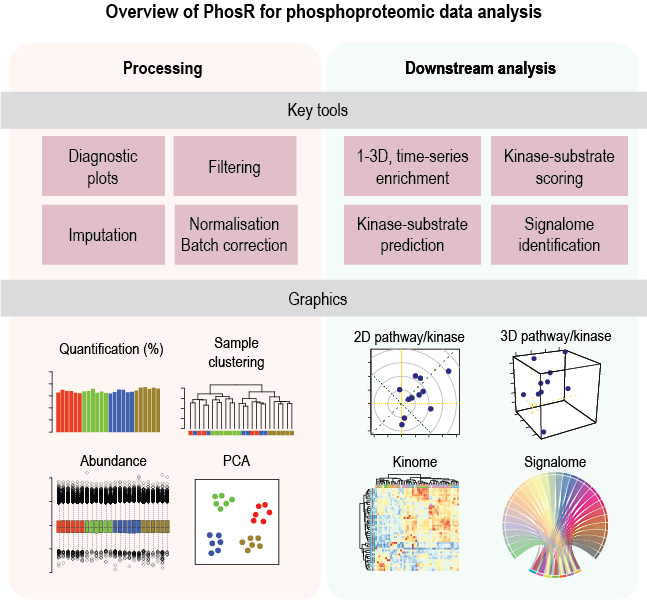PhosR is a package for the comprehensive analysis of phosphoproteomic data (https://doi.org/10.1016/j.celrep.2021.108771). There are two major components to PhosR: processing and downstream analysis. PhosR consists of various processing tools for phosphoproteomic data including filtering, imputation, normalisaton and batch correction, which enables integration of multiple phosphoproteomic datasets. Downstream analytical tools consists of site- and protein-centric pathway analysis to evaluate activities of kinases and signalling pathways, large-scale kinase-substrate annotation from dynamic phosphoproteomic profiling, and visualisation and construction of signalomes present in the phosphoproteomic data of interest.
Install the development version from GitHub using the devtools package:
library(devtools)
devtools::install_github("PYangLab/PhosR")Please find the links to our vignette below. Note that the vignette utilises subsets of the full phosphoproteomic datasets that were used in our pre-print, meaning that the results will not be identical and are for demonstration purposes only.
- Introduction
- Processing of phosphoproteomic data
- Downstream analysis of phosphoproteomic data
- Kim, H.✢, Kim, T.✢, Hoffman, N., Xiao, D., James, D., Humphrey S., Yang, P. (2021) PhosR enables processing and functional analysis of phosphoproteomic data. Cell Reports, 34(8), 108771. (https://doi.org/10.1016/j.celrep.2021.108771)
- Kim, H., Kim, T., Xiao, D. & Yang, P. (2021) Protocol for the processing and downstream analysis of phosphoproteomic data with PhosR. STAR Protocols, 2(2), 100585. (https://doi.org/10.1016/j.xpro.2021.100585)
If you have any enquiries, especially about performing PhosR to analyse your phosphoproteomic data, please contact [email protected] or [email protected]. We are also happy to receive any suggestions and comments.

